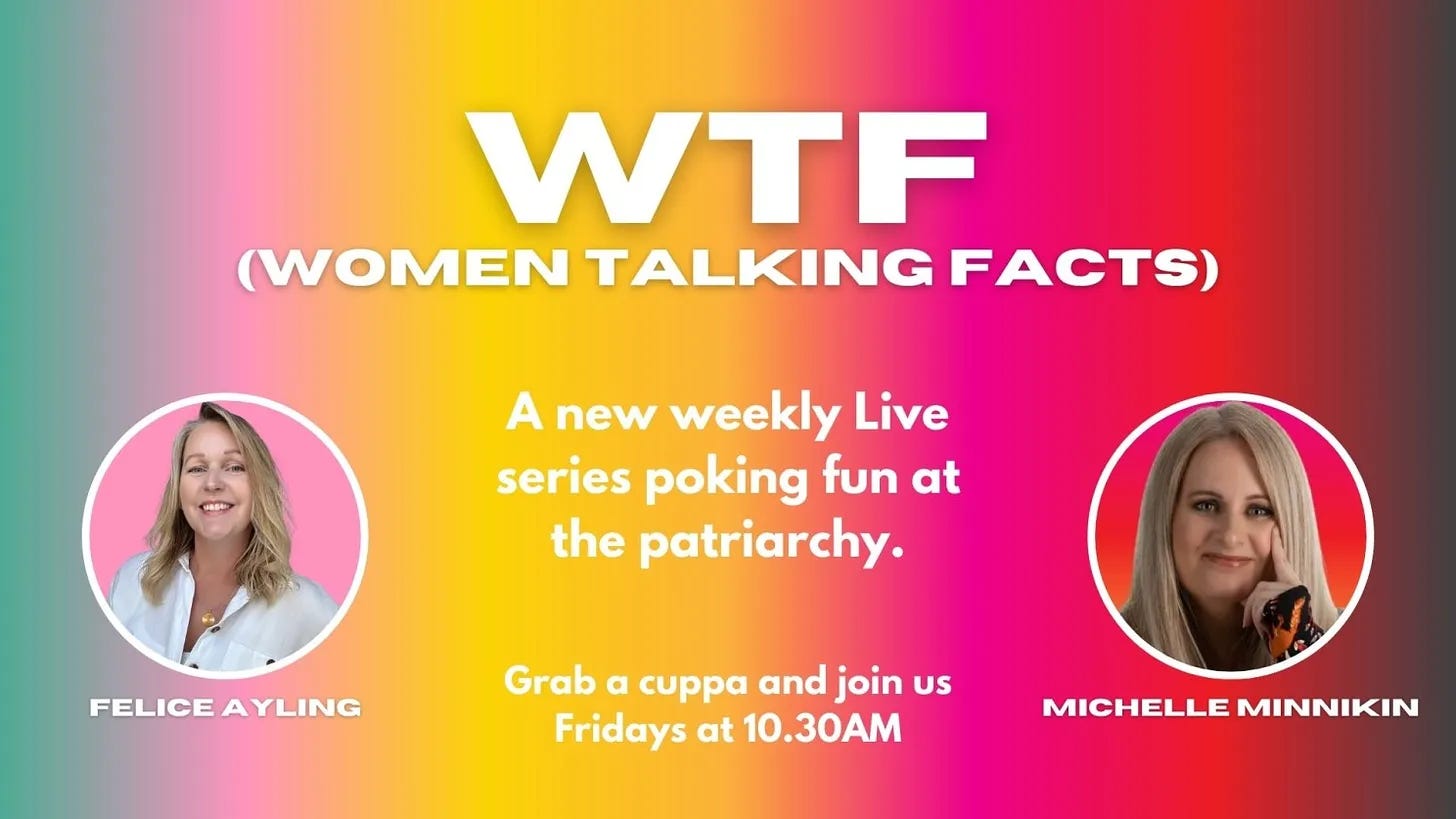This week, I spoke with a wonderful woman who’d read and enjoyed my book, Good Girl Deprogramming. I say “enjoyed,” but that’s not quite right - she experienced it. She laughed, she seethed, and she wrestled with its implications. She told me she tried to explain the book to one of her friends. “I told her about it,” she said, “and her response was, ‘But why would we ever want to stop being good girls?’”
This question lingered with me. Why would anyone want to stay a “good girl”? It’s one I brought to my Good Girl Rebellion Gang yesterday to ‘crowdsource’ answers. What emerged were compelling reasons, each rooted in the comforts of conformity and the fear of change.
The Pull of the Good Girl Persona
The allure of being a “good girl” lies in its simplicity. Following societal rules and expectations often feels easier than questioning them. Success frequently stems from doing what’s expected of us - excelling at school, landing a good job, getting married, raising children. Even when these achievements leave us stressed, unhappy, and resentful, the familiar script feels safer than the uncertainty of rewriting it.
Change is hard. Conformity offers predictability, structure, and validation. As members of the Good Girl Rebellion Gang put it, “It’s easier to stick to the rules than to challenge them,” and “Change feels exhausting when you’re already burnt out from trying to meet everyone’s expectations.”
But at what cost?
The Hidden Cost of Being ‘Good’
The price of staying a “good girl” isn’t always visible, but it’s felt deeply. It can show up as:
Resentment - constantly putting others first while suppressing your own needs.
Exhaustion - balancing impossible standards in your work and personal life.
Lost identity - over time, the act of being ‘good’ for everyone else erodes your sense of self.
What’s more, being a “good girl” doesn’t just harm individuals - it upholds systems of inequality. By adhering to the rules of “niceness” and submission, women often inadvertently reinforce the patriarchy, a system that benefits from our compliance. A society built on patriarchal values thrives when women stay in their designated roles, prioritising others’ needs over their own, remaining quiet and agreeable, and shying away from conflict or ambition.
In my book, I explore how this dynamic isn’t just a personal struggle; it’s a structural issue. The societal conditioning that keeps women striving for perfection and approval is the same force that maintains unequal power dynamics. When women conform, the system doesn’t have to change. And when the system doesn’t change, we pass the same oppressive expectations onto future generations .
Why Break Free?
If being a “good girl” comes with so many challenges, why not let it go?
Here’s what we’ve uncovered through these conversations:
To reclaim your individuality. Being “good” often means giving up what makes you unique. Breaking free is about rediscovering who you are when you’re not living for others.
To find true fulfilment. Imagine pursuing what truly makes you happy, rather than what you’ve been told should make you happy.
To challenge the system. Every time a woman says no to “good girl” conditioning, she disrupts the status quo. Breaking free isn’t just a personal act—it’s a revolutionary one that chips away at the foundations of patriarchy.
To create a better legacy. By challenging the systems that condition us, we leave the world a little freer for the next generation .
Yet, in reality, the more of us who stop being good, the more permission we give others to do the same. And that’s how we create real change.
It’s Time to Choose
The question, “Why would anyone want to stop being a good girl?” invites deep reflection. For some, the “good girl” path feels like home—a place of order, control, and approval. But for others, it’s a gilded cage.
Are the comforts of being “good” worth the cost of your authenticity, happiness, and freedom? Or is it time to break free and embrace the messy, rebellious, and beautifully imperfect journey of being yourself?
If this resonates with you, I invite you to take the Good Girl Quiz and start your own deprogramming journey. If you’ve already done it, have another go. Or send it to your friend. Or gather your friends, form your own Good Girl Rebellion Gang, and start exploring these ideas together. After all, every step away from “good” is a step towards something real.
How does this feel?
And What Else is Happening?
1. Good Girl Deprogramming Podcast
In this episode of the Good Girl Deprogramming Podcast, I dive into an enlightening and heartfelt conversation with somatic healer and trauma expert Rose Covenant. From the magical surroundings of Cusco, Peru, Rose shares her journey of breaking free from “good girl” conditioning and embracing authentic, unapologetic living.
The discussion covers everything from the deep societal expectations placed on women to the intersection of neuroscience and spiritual healing. Together, we unpack how conditioning impacts our nervous systems, why self-compassion is key to healing, and the importance of reconnecting with individual and collective power to create meaningful change.
What You’ll Learn in This Episode:
How societal expectations enforce the “good girl” persona and its connection to the patriarchy.
The challenges and triumphs of letting go of external validation and living authentically.
The interplay between survival mechanisms and self-compassion in the healing process.
Why collective healing is just as important as individual growth.
The lingering effects of historical traumas, like the witch trials, on modern women’s sense of safety.
Practical steps to start showing up mask-free in your life and relationships.
You can find it on all the usual podcasting platforms or on YouTube -
2. WTF (Women Talking Facts)
WTF was back this week, we talked a lot about Connor McGregor (and other incidents of misogyny and sexism in the wild. You can watch the replay here.
If you want to tune in live, next Friday morning at 10:30, come follow us on LinkedIn.
3. ADHD Made Me Do It
For those who have read my book (or heard me speak), you’ll know that meeting a wonderful human called Anna Price changed my life forever (in a good way!). We met when she was talking about her ADHD diagnosis and EVERYTHING about what she said hit home.
Soooo when I was asked to come along and deliver a workshop at her retreat next year, I didn’t even think, I said hell yes.
There’s more info here and you can book directly on Anna’s website here.
Give me a shout if you have any questions at all.
Have a lovely week,
Mx







Missed the GGG pow-wow yesterday but 💯 have always been challenged by women over my good girl rebellious ways. From my Grandmother who told me “…you can’t have you ‘druthers’…” to my own mother who whispered go and do what I couldn’t but out loud said she wished I’d been a teacher. It kept me in a relentless cycle of rebellion then guilty defeated compliance. It was my own daughter’s rebellion that flipped the switch and broke the cycle.
I would say legacy and true fulfillment are the biggest factors for me. Legacy is at the heart of all woman’s movements from getting the vote, woman against gun violence, #metoo equal pay… it’s not about us but our daughters.
It's not even a gilded cage - it's a prison of our own and society's making. I thought I was independent, but somehow I became complicit in being a 'good girl.' It's only now, at 53, that I'm starting to break free and unlearn all the 'good girl rules' that my own mother instilled in me.